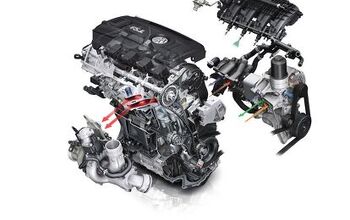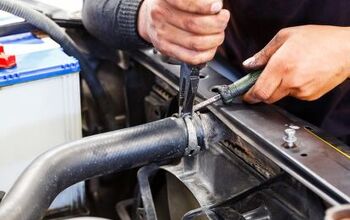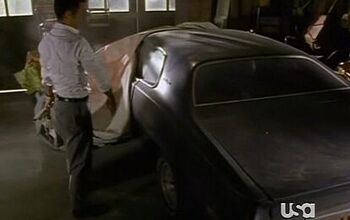Piston Slap: A Flexible Burn?

Stephen writes:
Sajeev,
My wife has a ’99 Camry (4-cyl) that smokes like a chimney. While I think it’s fun to see other people’s reactions while sitting in traffic on the 405, she’s getting tired of the constant smell of noxious gases and embarrassing looks in the office parking lot.
I’ve narrowed the origin of the smoke down to the exhaust flex coupling right under the oil pan, which is covered in baked on oil residue. It looks like when the engine is running, oil is dripping out of that basket-weaved coupling and causing the smoke. I can’t see anything dripping down onto it from above, however, and it doesn’t seem to consume too much oil, maybe 1/2 qt. over ~ 2 months. This may be due to my wife’s short commute – only about 4 miles a day, on city streets, so it doesn’t have too much time to burn off a lot. Apparently it doesn’t take too much oil to create a large amount of smoke, though.
The forums haven’t been too much help on this one so far, and so I’m stuck on how to proceed. Other than replacing that flex coupling, where’s the next place to look? I’m suspecting it’s a combination of head gasket replacement and a valve job, but I’d rather have a little more confidence in that solution before spending the weekend rebuilding the top end.
Looking forward to your expert opinion.
Sajeev answers:
Dude, I seriously doubt you have a head gasket problem. You’d have far more issues on the 405 if that was the case.
Usually an oil leak (on an otherwise fully functioning engine) dripping on the exhaust comes from leaky valve cover (cam cover to be exact) and that’s not a big deal at all. I know that 4-cyl Camrys from this era did have bad valve stem seals, but that only causes a little blue-ish smoke at start-up.
Unfortunately I don’t have a Camry around to eyeball me a diagnosis. So my guess is you have a bad valve cover gasket, loose valve cover bolts or a combination of both. Do two things, right off the bat.
1. Re-torque the valve cover bolts to spec.
2. Wash the engine with a can of degreaser ($3) and a garden hose. Or a coin-operated car wash. Since you have a drip all the way to the flex tube, spray the degreaser down there too before hosing everything down.
Now what? Monitor the valve cover gasket for leaks. Hell, check every single place oil can leak, as you now have that luxury. Odds are you will find the source, and odds are it is a very cheap gasket that needs attention.
Send your queries to sajeev@thetruthaboutcars.com. Spare no details and ask for a speedy resolution if you’re in a hurry…but be realistic, and use your make/model specific forums instead of TTAC for more timely advice.

More by Sajeev Mehta
Latest Car Reviews
Read moreLatest Product Reviews
Read moreRecent Comments
- Daniel J Our CX-5 has hit its automatic brakes a few times at in very unnecessary situations. My 2018 doesn't have it, but it will shake and throw a warning if it thinks you should brake. Only once was it needed. The dozen or so times it has gone off I was already on the brakes or traffic was in a pattern that just fooled it.
- Kosmo This would become interesting with a turbo and 6MT.
- CanadaCraig 'Afraid' is the wrong word. The question should be, "Do you trust autonomous cars to get you from point A to point B and all points in between safely?" And my answer to that question is 'NO'.
- Daniel J For us it's just woefully underpowered. Put the 2.5T in it then I might consider it.
- Bd2 Such practices are deeply frowned upon by Kia and Hyundai dealerships where consumers sport increasing credit scores and household incomes to boot.

































Comments
Join the conversation
When I've cleaned engine bays due to the issues of damaging electronics I use Simple Green, it's a great degreaser. I run the engine until warm, 5 to 10 minutes. Then I mist the engine bay until damp. Stress, mist. Then I spray it down with Simple Green. I leave the engine running while I do this. I then lower the hood, but don't latch closed for about five minutes. The engine basically steam cleans itself. Then I open the hood, mist the engine again until the bubbles no longer run, and then shut it down. I've never hurt an alternator, sensor, or electrical item. The object is to mist, because the engine is designed to get lightly wet, just not inundated with a hose.
The best way I've found for tracking down the origins of leaks is with UV dye. For those who don't know, you basically put a small amount of dye where you put in your oil, wait a few days, then take a UV light in the dark and you can see the trail of oil leaks. You can buy a kit at an auto parts store for around $30 that comes with a light. Dye refills are about $5 a piece. Far less than what it takes to have a shop diagnose just one time. But the flex pipe has nothing to do with it, and my stab in the dark is also that its a leaky valve cover which is very common. You also might want to replace you PCV valve, it could be plugged up and causing pressure. But I'd always recommend finding out exactly where the leak is coming from rather than shotgunning gaskets at the problem.